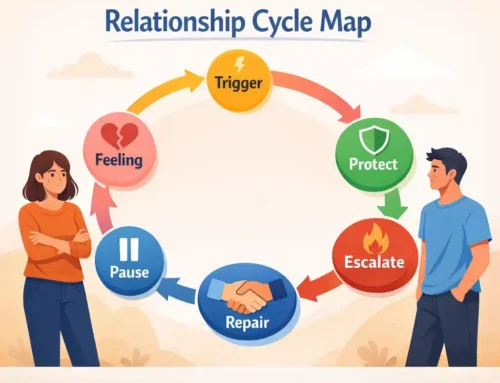
Approx. read time: 7.9 min.
Post: 5 Womens Preferred Love Language – Why Actions Win
A Psychologist Reveals womens preferred love language (and How To Use It)
🔎 What’s womens preferred love language?
Most women feel most loved through reliable, concrete actions rather than romantic talk. A 2025 peer-reviewed study in Evolutionary Psychological Science found women consistently preferred “sweet actions” (tangible care) over “sweet words,” and they judged action-oriented partners as warmer and more trustworthy. Men were more flexible, often responding to both, depending on the context. SpringerLink+1
In plain terms: If you want love to land—especially with women—do what you say and show up in small, steady ways.
🧪 What the new study actually found – womens preferred love language
Researchers Xing Shu and Jianmin Zeng ran three experiments (N≈513) comparing reactions to “sweet words” (e.g., “I miss you”) vs. “sweet actions” (e.g., running an errand, helping with a task). Women favored actions more than men; across scenarios, actions boosted perceptions of a partner’s warmth and trustworthiness, which in turn increased interest in commitment. Men showed less of a gap and were more sensitive to framing and context. Womans favorite love languages to receive are in your actions. SpringerLink+2ResearchGate+2
This lines up with decades of relationship science showing that warmth-trustworthiness is the single strongest, cross-sex predictor of mate choice and long-term satisfaction. PubMed
🧬 Why evolution nudges women toward actions
From an evolutionary lens, pregnancy and childcare are costly, material tasks. Signals that a partner will reliably invest—time, effort, resources—carry more weight than verbal pledges. Tangible behaviors are also harder to fake than words, making them better trust signals. That’s why womens preferred love language often centers on acts of service, consistency, and follow-through. PsyPost – Psychology News
🗣️ What about men—are words a bigger deal?
Men often respond strongly to verbal affection and emotional warmth, and their preferences can shift depending on which signals are most salient in the moment. When researchers dialed up the “sweetness” of actions in their materials, men’s preferences moved toward actions too. The takeaway: most men appreciate both clear of affirmation words and visible effort—so long as they feel sincere and well-timed. PsyPost – Psychology News
🌡️ The real mechanism: perceived warmth & trust
Across sexes, the underlying driver was perceived warmth and trustworthiness. Words or deeds “work” when they increase your partner’s felt sense of safety + care—and they back each other up. That fits broader findings: people who say they value warmth-trust tend to choose warm-trustworthy mates and enjoy better marriages. PubMed
🏷️ What this means for modern couples (and your day-to-day)
If womens preferred love language is action, and men often respond well to affirmation, the healthiest relationships blend both with great timing:
-
Use actions to lower stress and build security.
-
Use words to name feelings, celebrate effort, and make the emotional climate warm.
-
Use both together for apologies and turning points: say it + show it.
🧰 The Action Playbook (especially effective for womens preferred love language)
Small, steady behaviors compound into deep trust: a love language
-
Keep micro-promises. If you say “I’ll call at 7,” call at 6:59.
-
Lighten the load. Handle a dreaded task without being asked.
-
Be physically present. Show up for milestones and boring Tuesdays.
-
Mind the details. Remember coffee orders, schedules, and sensitivities.
-
Close the loop. Give quick updates: “Done—anything else to make today easier?”
These signal reliability and investment, the bedrock of womens preferred love language. PsyPost – Psychology News
💬 The Word Playbook (simple scripts that land with many men)
Words that resonate tend to affirm character, effort, and impact:
-
“I love how patient you were with the kids tonight.”
-
“Thanks for handling the car stuff—I felt really taken care of.”
-
“I admire how you kept your cool and solved that.”
-
“You’ve been consistent lately; I notice it and it means a lot.”
Pair praise with a why it matters to me clause for extra warmth.
🔄 The 2×2 Framework: Match the message to the moment
Use this quick chooser: womens preferred love language
-
High stress / logistics mess? → Actions first. Do, then debrief.
-
Vulnerable / identity moments? → Words first. Validate, then plan.
-
Repairing a rupture? → Both. Clear apology + a visible change.
-
Celebration? → Both. Speak the appreciation + plan a treat.
📊 Actions vs. Words at a glance (how each typically helps)
| Signal | Best for | Why it works | Common pitfalls |
|---|---|---|---|
| Consistent actions | Safety, trust, de-stress | Harder to fake; shows investment | Invisible labor if never named |
| Affirming words | Identity, bonding, motivation | Names value; creates emotional warmth | Can feel hollow without follow-through |
| Both together | Apologies, milestones, repair | Aligns intent + behavior | Over-performing without sincerity |
🧩 Where “Love Languages” fit (and where they don’t)
Gary Chapman’s “Five Love Languages” are popular, but the empirical support is mixed. Relationship scientists argue people typically appreciate multiple forms of love, the categories overlap, and matching “primary languages” isn’t a silver bullet. The more durable theme is still warmth-trust + responsiveness—which can show up as actions, words, touch, time, or gifts. SAGE Journals+1
So do you toss love languages out? Not necessarily. Use them as conversation starters, not fixed boxes. Keep your eye on the deeper target: Does my partner actually feel safe, seen, and supported—consistently?
🧪 Limits & nuance (read this before over-generalizing)
-
The new experiments sampled heterosexual adults in China, which can shape norms and responses; results may not generalize to all cultures or orientations. PsyPost – Psychology News
-
Media recaps (Forbes, PsyPost) align with the paper, but always defer to the primary source for details. Forbes+1
-
Sex differences in desire and expression exist on averages; individual couples vary widely. PubMed+1
🧮 Mini self-audit (10 quick questions) – womens preferred love language
-
When stressed, do I want help or a hug first?
-
What three actions make me feel safest?
-
What words do I wish I heard weekly?
-
Where have I over-promised / under-delivered?
-
Which routines could I automate to lighten my partner’s load?
-
What “micro-promise” could I keep today?
-
Do my apologies come with a visible change?
-
How often do I name my partner’s strengths out loud?
-
How do I want love shown on hard days vs. good days?
-
What would “warm + trustworthy” look like this month?
🧭 Put it into practice this week (5-step plan)
-
Pick one stress-reducing action you can do daily (e.g., dishes, bedtime routine, commute pickup).
-
Add one verbal appreciation per day that names character (patient, thoughtful, reliable).
-
Close a loop you’ve let dangle (repair, refund, call, appointment).
-
Schedule a 20-minute check-in: “What helped you feel loved this week?”
-
Choose one repair ritual (apology + changed behavior) and write it down.
❓ FAQs – womens preferred love language
Q1. What is womens preferred love language—really?
Many women report feeling most loved by reliable, tangible actions. That preference shows up in new experimental data and in real-life satisfaction studies centered on warmth-trust. SpringerLink+1 – real or important love language
Q2. Does that mean words don’t matter for women?
Words still matter—especially during vulnerable moments. They just work best when your actions match them.
Q3. Are men’s preferences the opposite?
Not exactly. Men often value verbal affirmation more than people assume, but their preferences shift with context; meaningful actions still count. PsyPost – Psychology News
Q4. How do I know whether to use words or actions?
Check the moment: high stress → actions first; identity or emotion → words first; repairs and milestones → both.
Q5. Is the “Five Love Languages” framework scientific?
It’s popular and can be useful conversationally, but evidence is mixed. Relationship science points to warmth, responsiveness, and reliability as the deeper engine. SAGE Journals
Q6. What’s one fast way to build trust?
Keep micro-promises (texts, times, small tasks). Consistency is surprisingly romantic.
Q7. How do we fix “all talk, no action”?
Adopt a two-part rule: never make a promise without a calendar step; never apologize without a behavior change you can name and measure.
Q8. We’re long-distance—do actions still matter?
Yes. “Actions” can be digital (auto-pay a shared bill, arrange deliveries, handle admin) and relational (book tickets, set reminders, send helpful links).
Q9. How often should I give verbal affirmation?
Daily, in small doses. Make it specific (“I loved how you handled…”) and tie it to impact (“It helped me feel calm.”).
📚 Sources & references
-
Shu, X., & Zeng, J. (2025). Who Favor Sweet Actions over Sweet Words More – Females or Males? Evolutionary Psychological Science, 11(2), 169–182. (Primary finding.) SpringerLink
-
PsyPost summary of the paper (2025). (Accessible recap, consistent with the original.) PsyPost – Psychology News
-
Valentine, K. A., et al. (2020). Mate Preferences for Warmth-Trustworthiness Predict Attraction & Satisfaction. (Mechanism link.) PubMed
-
Impett, E. A., et al. (2024). Evaluating Love Languages from a Relationship-Science Perspective. (Skeptical review; why matching “languages” isn’t magic.) SAGE Journals
-
Forbes feature on the new study (2025). (Media framing consistent with the primary source.) Forbes
🔚 Conclusion: Words and deeds—timed with care
If you remember one thing, make it this: womens preferred love language leans toward dependable action, because actions build warmth and trust. Men often welcome clear, affirming words, especially when they feel sincere. The best relationships don’t choose between them—they integrate both, matched to the moment, and backed by follow-through.










